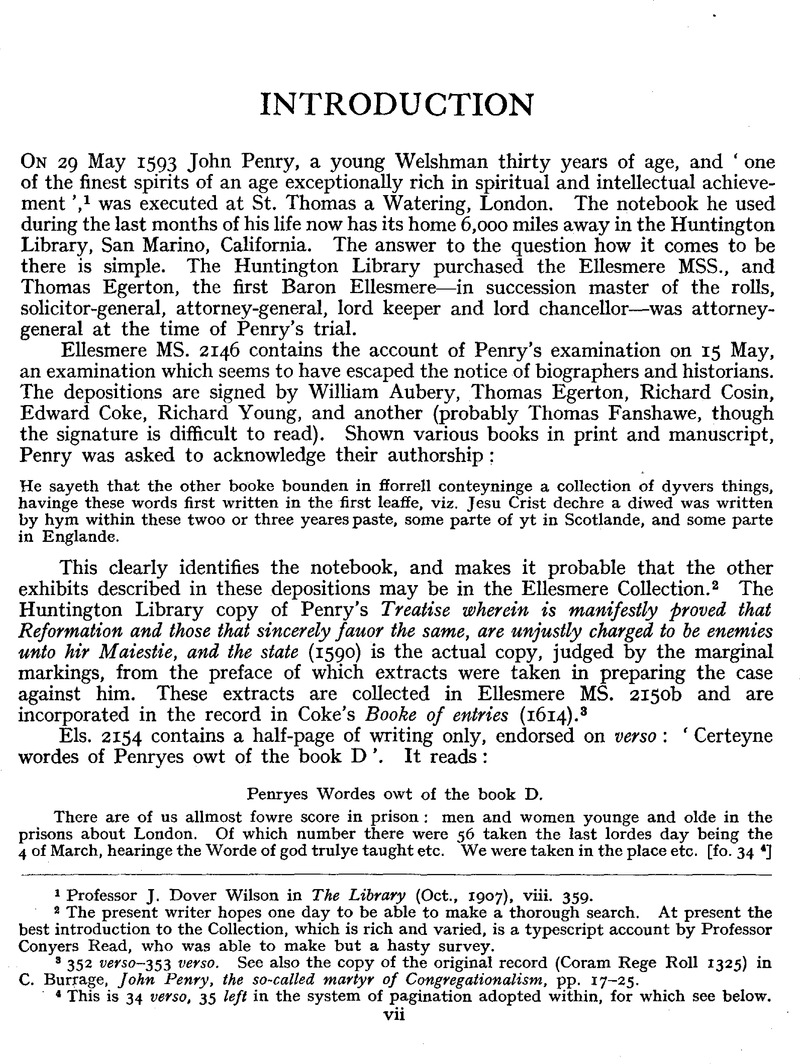No CrossRef data available.
Article contents
Introduction
Published online by Cambridge University Press: 24 December 2009
Abstract

- Type
- Introduction
- Information
- Copyright
- Copyright © Royal Historical Society 1944
References
page vii note 1 ProfessorWilson, J. Dover in The Library (Oct., 1907), viii. 359.Google Scholar
page vii note 2 The present writer hopes one day to be able to make a thorough search. At present the best introduction to the Collection, which is rich and varied, is a typescript account by Professor Conyers Read, who was able to make but a hasty survey.
page vii note 3 352 verso-353 verso. See also the copy of the original record (Coram Rege Roll 1325) in C. Burrage, John Penry, the so-called martyr of Congregationalism, pp. 17–25.
page vii note 4 This is 34 verso, 35 left in the system of pagination adopted within, for which see below.
page viii note 1 As E.E.D. and John Penry.
page x note 1 Cf. John Udall's The true remedie against famine and warns, five sermons ‘preached in the time of the dearth in 1586’.
page x note 2 Bancroft, Dangerous positions, pp. 74, 75.
page x note 3 Ath. Oxon. (1813), i. 592. He copies most of this from An Almond for a parrat.
page xi note 1 Æquity, pp. 39, 40, 43.
page xii note 1 Lansdowne MSS. 53. 71.
page xii note 2 70. 184 recto and verso. The letter will be printed in full elsewhere.
page xii note 3 See Peel, The Seconde parte of a register, passim. Burghley's protests in 1584, that ‘the Inquisition of Spain used not so many questions’ and that the policy seemed ‘a device to seek for offenders rather than to reform any’, were turned aside with the rest.
page xii note 4 Is there a case on record of an acquittal by the Court of High Commission ?
page xiii note 1 Penry's Appellation (1589), pp. 42 f. In this book Penry gives an account of his experiences.
page xiv note 1 Professor Dover Wilson has done the soundest work on the Tracts, his chapter in the C.H.E.L., from which these words are quoted, being masterly; his articles in The Library, notably Martin Marprelate and Shakespeare's Fluellen (1912, reprinted separately), where he sets forth a new theory of the authorship, are indispensable for students. So also are W. Pierce, Historical introduction to the Marprelate Tracts (1908) and The Marprelate Tracts (text, 1911). Arber's Introductory sketch prints many of the relevant documents. R. B. McKerrow's pages on ‘The Marprelate controversy’ and ‘Note on the Martinist Press’ in his edition of Nashe's works (v. pp. 34–65, 184–92) should also be studied.
page xiv note 2 A study of these dates in 1588 is suggestive : July 19–28 Armada dispersed Oct. 15 The Epistle Sep. 4 Death of Leicester Nov. 10 Williams returns to England „ 5 Marriage of Penry „ 15 Queen attends Te Deum at St. Paul's Oct. 9 Williams goes to Netherlands „ 29 The Epitome.
page xiv note 3 See Arber, Introductory Sketch, p. 94.
page xiv note 4 An Answere to Job Throckmorton, 70 verso.
page xv note 1 An Answere, 70 verso.
page xv note 2 The Defence of Job Throckmorton, E. ii. recto.
page xv note 3 The First parte of Pasquils apologie, B. 2 v. (McKerrow, i. 115).
page xvi note 1 See Arber, 117.
page xvi note 2 This seems to be the method by which Throckmorton escaped.
page xvi note 3 See Harleian Miscellany (1808), i. 219.
page xvii note 1 State Trials (Cobbett, 1809), i. 1273, 1294.
page xvii note 2 Pierce, Marprelate Tracts, pp. 380–1.
page xvii note 3 Sidney Lee in D.N.B.
page xix note 1 E.E.D., ii. 57–8. He says November. This is either a mishearing or a miscopying Penry says September, and it is clear he was in London in that month.
page xix note 2 See Burrage, E.E.D., ii. 41–2, 58–9.
page xix note 3 Printed in Strype, Annals, iv. 131–6.
page xix note 4 In Burrage, E.E.D., ii. 66–79.
page xx note 1 Jenkin Jones, a kinsman, who was mixed up with the Marprelate business.
page xx note 2 Lans. MSS. lxviii. 27. Endorsed ‘Feb. 1592, Roger Rippon dyed in Newgat’.
page xx note 3 A monograph on him is in preparation.
page xx note 4 There are few more poignant letters in English than these. There were contemporary printings of those to Mrs. Penry and the church, but that to the children has never been printed in full (in part in Waddington). It has now been transcribed and will appear with the other two in the edition of Penry's works. Perhaps I may be allowed to refer to my The Christian basis of democracy (1943), one of the lectures in which deals with Penry and quotes from the letters.
page xxi note 1 There is a reference to ‘Mr. Henry Barrowes study in the Flette’ in Studley's evidence in the Egerton Papers, 175.
page xxi note 2 John Penry.
page xxi note 3 The Confession was printed at the time. But see Burrage, E.E.D., ii. 79–96, bearing in mind the warning above, p. viii.
page xxii note 1 The letter to the children, written for when they came to years of discretion, is amusing as.well as pathetic : he even advises them how they should give themselves in matrimony.
page xxii note 2 ‘No Bishoppe that ever had suche an aspiring and ambitious a minde as he ; no not Cardinal Wolsey : none so proud as he, no not Steuen Gardiner of Winchester ; none so tyrannical as he, noe, not Banner’ (Dialogue wherin is plainly laide open, D. 3 recto).
page xxii note 3 S.P.D., Elizabeth, ccxliv. 124.
page xxiii note 1 See above, p. xviii.
page xxiii note 2 Burrage, John Penry, 20.




